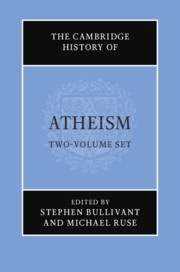Book contents
- The Cambridge History of Atheism
- The Cambridge History of Atheism
- Copyright page
- Dedication
- Contents
- Acknowledgments
- Contributors
- Introduction
- Part I Preliminaries
- Part II Atheisms in History
- Part III Reformation, Renaissance, Enlightenment
- Part IV Classical Modernity: Philosophical and Scientific Currents
- Part V Classical Modernity: Social and Political Currents
- 23 The French Revolution
- 24 Freethinkers, Atheists, and Anticlericals: Spanish American Struggles for Independence
- 25 Marx and Marxisms
- 26 Nineteenth-Century Russia
- 27 Secularism and Humanism
- 28 Bertrand Russell
- 29 Robert Ingersoll
- 30 Early Women’s Movement
- 31 Early African American Secularism
- Part VI Twentieth and Twenty-First Centuries: Intellectual and Artistic Currents
- Part VII Lived Atheism in the Twentieth- and Twenty-First Centuries: Case-Studies
- Part VIII Emerging Atheisms in the Twenty-First Century
- Part IX Conclusion
- Index
- References
30 - Early Women’s Movement
from Part V - Classical Modernity: Social and Political Currents
Published online by Cambridge University Press: 25 September 2021
- The Cambridge History of Atheism
- The Cambridge History of Atheism
- Copyright page
- Dedication
- Contents
- Acknowledgments
- Contributors
- Introduction
- Part I Preliminaries
- Part II Atheisms in History
- Part III Reformation, Renaissance, Enlightenment
- Part IV Classical Modernity: Philosophical and Scientific Currents
- Part V Classical Modernity: Social and Political Currents
- 23 The French Revolution
- 24 Freethinkers, Atheists, and Anticlericals: Spanish American Struggles for Independence
- 25 Marx and Marxisms
- 26 Nineteenth-Century Russia
- 27 Secularism and Humanism
- 28 Bertrand Russell
- 29 Robert Ingersoll
- 30 Early Women’s Movement
- 31 Early African American Secularism
- Part VI Twentieth and Twenty-First Centuries: Intellectual and Artistic Currents
- Part VII Lived Atheism in the Twentieth- and Twenty-First Centuries: Case-Studies
- Part VIII Emerging Atheisms in the Twenty-First Century
- Part IX Conclusion
- Index
- References
Summary
The history of atheism and its relationship with women has been a rocky one; the continuing schism between feminism and atheism has been a staple from the early days of atheism as a social movement. This has puzzled many, since the two movements have often seemed to share common interests, but despite this outward compatibility, women have struggled to find their place and have their voices heard within the movement (Miller 2013). When the history of unbelief has been written, the perspective has continued to be that of a white male. This chapter is driven by the question: what can we learn when we look at the history of atheism from the perspective of women?
- Type
- Chapter
- Information
- The Cambridge History of Atheism , pp. 550 - 567Publisher: Cambridge University PressPrint publication year: 2021



